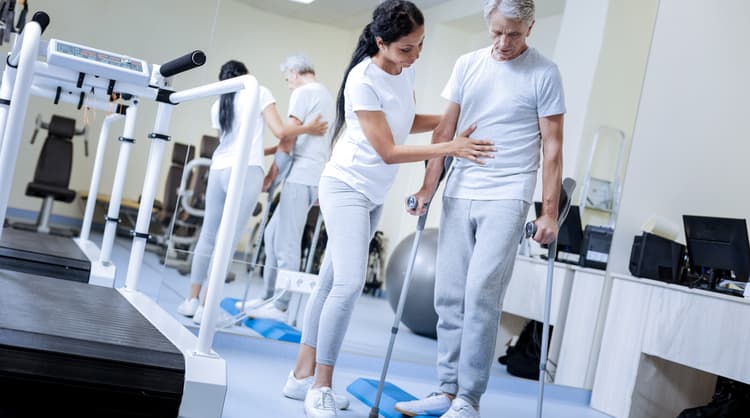5 types of counselling jobs in Australia

For the compassionate, empathetic, and socially-inclined among us, a career in counselling can be an ideal fit.
Australia’s counselling industry is a massive one on the rise, expecting an approximate 30,500 workers by 2023 (a great leap from 25,900 in 2018). It’s a much-needed field with opportunity to change others’ lives for the better, whether in the areas of marital struggles, loss, and grief or those of mental health and addiction.
With counsellors found in a wide range of settings – including health centres, schools, and not-for-profit organisations, work can be found in most regions of the country.
SkillsTalk break down five main types of counselling jobs to pursue in Australia.
What types of counselling jobs are there in Australia?
- School counsellor.
- Rehabilitation counsellor.
- Drug and alcohol counsellor.
- Family and marriage counsellor.
- Mental health Counsellor.
1. School counsellor.
Those who enjoy working with and supporting young Australians may take on the role of a school counsellor.
These professionals play a major part in the social, academic, and professional development of students, helping them overcome obstacles to personal or educational progress. School counsellors may also communicate with parents or teachers to discuss problematic behaviour among students and ways to rectify this.
A skilled understanding of sociology and psychology is recommended for this role, as you’ll be identifying any special needs, mental health, or social challenges among your clients. Drug and alcohol abuse may sometimes be present in troubled students; these will likely require developing rehabilitation plans to help with recovery, or connecting them to the proper support services.
You’ll also be assisting clients with their post-school employment options, helping them in their job-hunting strategies and ways to develop the appropriate career skillsets.
Since trust and open communication are key, those in the field must also have excellent relationship-building skills, and the ability to help students develop the same.
2. Rehabilitation counsellor.

Those looking to help others through recovery of physical, social, or mental ailments may choose to pursue rehabilitation counselling.
Rehabilitation counsellors assist patients with mental or physical disabilities, offering treatment and support to help them live successful, independent lives. This process typically involves a thorough evaluation of patient needs, health, and abilities; developing the appropriate rehabilitation or treatment plan. Such strategies are often supported by the expertise of doctors, psychologists, and other professionals in healthcare.
As with school counsellors, these professionals require a high-level understanding of psychology and human behaviour. Through rehabilitation counselling, patients learn to understand their current situation, and how to adjust their attitude and expectations accordingly.
Rehabilitation counsellors work in a wide range of settings, including government agencies, schools, and private practices. They also choose from a variety of specialisations, including geriatrics, school children and military veterans.
Entering the field will commonly require a bachelor’s degree in counselling, psychology, or related field – though plenty begin their training through a VET (Vocational Education and Training) qualification.
3. Drug and alcohol counsellor.
With drug and alcohol addiction contributing to (approximately) 6,660 deaths a year, the need for corresponding health support has grown ever-more pressing.
If you wish to help others on their journey to recovery, the role of a drug and alcohol counsellor offers plenty of fulfilling challenges.
Experts in this field are responsible for the treatment and support of those struggling with drug and alcohol dependency. Much of the job involves developing the appropriate plans and strategies for bringing forth behavioural and attitude change, helping these individuals overcome their addiction. Drug and alcohol counsellors must therefore have calm, compassionate, and understanding character traits for handling clients with problematic behaviour or tendencies.
Patients are typically evaluated on their addiction type and severity before proceeding with the necessary counselling program. Their treatment is then documented and evaluated over time, with adjustments made as necessary. As such, skills in case management may be necessary to keep an accurate record of progress, along with providing regular updates to patients’ families.
Formal qualifications are often required to practice in this field, with VET courses being a common study pathway.
4. Family and marriage counsellor.

If you’re passionate about social dynamics and the psychological influences on relationships, you may fit the role of a family and marriage counsellor.
Family and marriage counsellors offer support to couples, families, and individuals struggling with relationship difficulties. They commonly assess the deeper, often psychological issues affecting these connections, such as substance abuse, depression, trauma, and infidelity. Mental health professionals can thus play a key role in strategizing the appropriate methods for therapy, working closely with these counsellors in assessing and analysing patient needs.
According to Psychology Today Australia, family and marriage counselling sessions begin with an assessment of both partners or all family members, followed by one-on-one sessions with each individual. Their goal is to help patients identify and understand relationship behaviours that often lead to conflict, and appropriate ways of resolving these issues.
Experts believe that involving all family members, or one’s partner, into the therapeutic process can lead to more effective solutions than dealing with parties individually.
Those working in family and marriage counselling must therefore have excellent interpersonal and relationship-building skills to foster open communication among their clients. Organisational skills are also crucial in maintaining multiple client records and case files.
5. Mental health counsellor.
Recent findings from the ABS National Health Survey discovered that 4.8 million Australians (about a fifth of the population) were diagnosed with a mental or behavioural condition between 2017-2018. There is fortunately continuous national support for such individuals, with services offered through hospitals and health centres by psychiatrists, psychologists, social workers, and counsellors.
Mental health counsellors require a high-level knowledge of psychological health problems and the factors that influence them. Their process primarily consists of helping patients understand their existing issues, and discovering new, effective ways of approaching them. Though this commonly takes place in one-on-one settings, plenty often lead group counselling sessions, as well.
These professionals can also choose to specialise in a variety of areas; such as in mental health problems surrounding Australian youth, or those impacting current inmates – helping them understand (and remedy) the issues that prompted their criminal behaviour.
As with most counselling roles, those working in mental health will often devise the appropriate treatment plans for their patients. Case management, administrative, and organisational skills are thus essential in maintaining important documents and monitoring progress.
The field of counselling is a challenging yet rewarding career path for many passionate Australians, offering opportunities for spurring positive social change. With high employment prospects across the nation (and plenty more in the years to come), these positions allow you to uplift, guide, and support those who need it most.
Looking to get into counselling?
Among their wide range of nationally-recognised community service courses, Upskilled offers a CHC51015 - Diploma of Counselling for those looking to get their start in the field.
Through subjects exploring therapeutic approaches to mental, social, and emotional health, students will learn appropriate methods of diagnosing and responding to a diverse range of patients.
Best of all, the course is delivered 100% online – allowing you to study while tending to other personal or work commitments. Get your foot in the door of Australia’s counselling industry, and enquire today.


)
)

